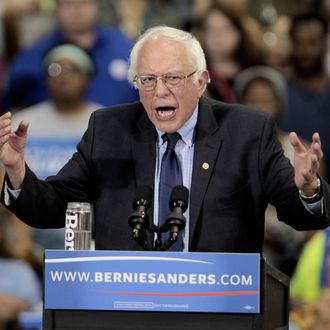
Five days before the most Jewish state in the union held its primary, Wolf Blitzer questioned Bernie Sanders’s commitment to Israeli security. The average politician would not have seen this as an opportunity to attack his or her opponent for caring too little about Palestinian suffering. But Vermont’s socialist senator is not your average politician.
“I read Secretary Clinton’s speech before AIPAC. I heard virtually no discussion at all about the needs of the Palestinian people,” Sanders said at the Democratic debate in Brooklyn. “Of course Israel has a right to defend itself, but long-term, there will never be peace in that region unless the United States plays an even-handed role, trying to bring people together and recognizing the serious problems that exist among the Palestinian people … There comes a time when, if we pursue justice and peace, we are going to have to say that Netanyahu is not right all of the time.”
Until that moment, the Israel-Palestine conflict — like every other issue of foreign affairs — had received scant attention in Sanders’s populist campaign. But now the Washington Post reports that changing American policy toward Israel will be one of the senator’s top priorities in the looming convention fight over the Democratic platform:
Sanders is seeking a more “even-handed” U.S. approach to Israeli occupation of land Palestinians claim for a future state. The current platform does not address the nearly five-decade occupation directly, but it endorses “a just and lasting Israeli-Palestinian accord, producing two states for two peoples.”
Sanders’s decision to contest this part of the platform is surprising, both because domestic issues enjoyed pride of place in his campaign, and because even the most anodyne shifts in the Democrats’ official position on Israel is likely to inflame intra-party tensions. In 2012, whether the party would explicitly recognize Jerusalem as the capital of Israel prompted days of infighting. The resolution ended up passing on a voice vote that had to be taken three times, as supporters of the measure tried to drown out a chorus of “noes.”
The senator’s eagerness to reopen this front of the party’s civil war signals the Democrats’ growing generational divide over the Israel-Palestine conflict. Sanders boasts overwhelming support from his party’s youngest voters — a constituency uniquely sympathetic to Palestinian concerns.
A 2014 poll found half of all Democrats under 30 supported punishing Israeli settlement expansion with economic sanctions. The vast majority of this demographic also preferred the United States to remain neutral in the Israel-Palestine conflict. But among those who wanted America to pick a side, more wished for their government to support the Palestinians, a stance shared by no other age group in either party.
Several overlapping factors explain this generational shift. For one thing, young Democrats are less white than their co-partisans, and Hispanics and African-Americans evince more sympathy for the Palestinian plight than the general population. In fact, 44 percent of Hispanic Americans — of all ages and political parties — support sanctioning Israel over its settlement activity.
Another factor is younger Jewish Americans’ relative disinterest in Zionism. Which is itself the product of multiple trends, including the cohort’s progressive political leanings, higher levels of assimilation, lower levels of religiosity, and relative insulation from virulent anti-Semitism.
But perhaps the most powerful force pulling millennials out of Israel’s corner is the steady right-wing lurch of the Jewish State itself. Hours after the Post reported Sanders’s platform intentions, Israel’s defense minister, Moshe Ya’alon, resigned in protest.
“I have lately found myself in difficult moral and professional controversies with the Prime Minister, a number of other ministers, and some members of Knesset,” Ya’alon told reporters in Tel Aviv on Friday. “To my great sorrow, they have taken over Israel, and the Likud movement, dangerous and extremist elements, that upend the house and threaten it. This is not the Likud movement that I joined.”
Ya’alon had recently encouraged Israeli generals to voice their concerns about the ethical ramifications of their government’s policies, a move that attracted the ire of Israeli prime minister Benjamin Netanyahu.
The prime minister has asked ultranationalist politician Avigdor Lieberman to replace Ya’alon as defense minister. Lieberman has argued that 90 percent of Israel’s Palestinian citizens “have no place here,” and should “take their bundles and get lost.” He also once called for bombing the Aswan Dam, a move that would, in the words of Middle East scholar Juan Cole, “have the effect of murdering all 80 million Egyptians and sweeping them into the Mediterranean in a vast continental African tsunami.”
It is highly doubtful that Hillary Clinton will allow a significant change in the Democratic Party’s official position on Israel-Palestine. But if the Jewish State continues marching ever rightward, it will become increasingly difficult for Democratic presidents to greet the expansion of Israeli settlements with mealymouthed disapproval and a few billion dollars of additional military aid.






























